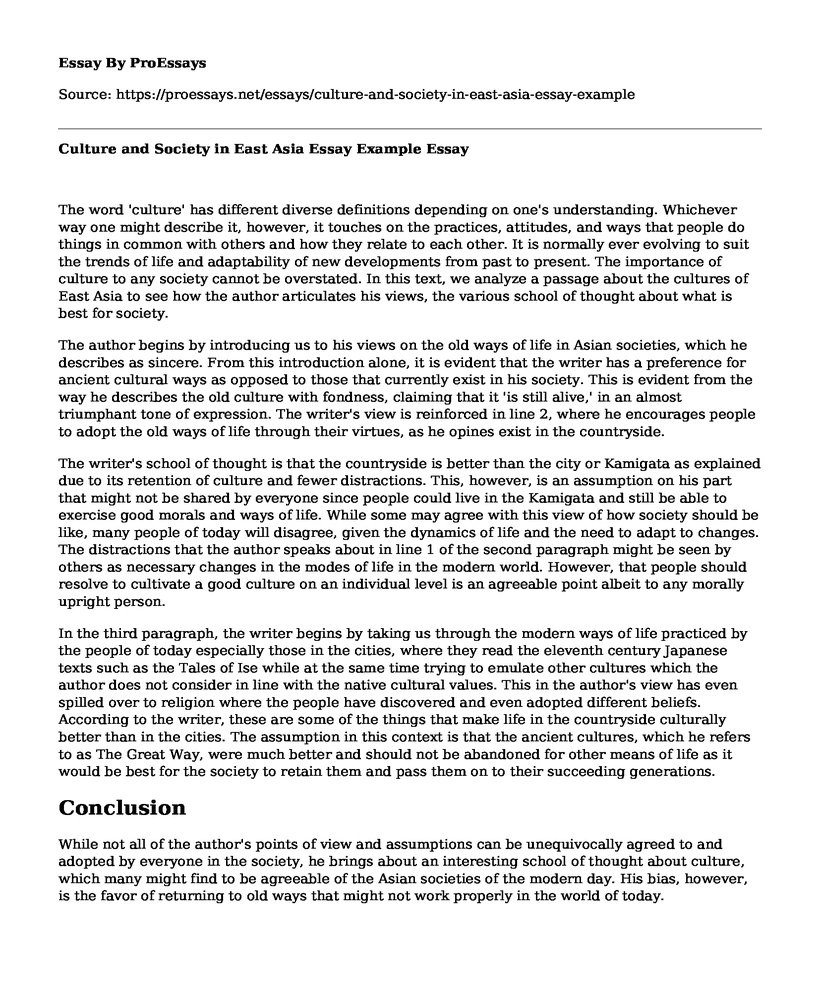The word 'culture' has different diverse definitions depending on one's understanding. Whichever way one might describe it, however, it touches on the practices, attitudes, and ways that people do things in common with others and how they relate to each other. It is normally ever evolving to suit the trends of life and adaptability of new developments from past to present. The importance of culture to any society cannot be overstated. In this text, we analyze a passage about the cultures of East Asia to see how the author articulates his views, the various school of thought about what is best for society.
The author begins by introducing us to his views on the old ways of life in Asian societies, which he describes as sincere. From this introduction alone, it is evident that the writer has a preference for ancient cultural ways as opposed to those that currently exist in his society. This is evident from the way he describes the old culture with fondness, claiming that it 'is still alive,' in an almost triumphant tone of expression. The writer's view is reinforced in line 2, where he encourages people to adopt the old ways of life through their virtues, as he opines exist in the countryside.
The writer's school of thought is that the countryside is better than the city or Kamigata as explained due to its retention of culture and fewer distractions. This, however, is an assumption on his part that might not be shared by everyone since people could live in the Kamigata and still be able to exercise good morals and ways of life. While some may agree with this view of how society should be like, many people of today will disagree, given the dynamics of life and the need to adapt to changes. The distractions that the author speaks about in line 1 of the second paragraph might be seen by others as necessary changes in the modes of life in the modern world. However, that people should resolve to cultivate a good culture on an individual level is an agreeable point albeit to any morally upright person.
In the third paragraph, the writer begins by taking us through the modern ways of life practiced by the people of today especially those in the cities, where they read the eleventh century Japanese texts such as the Tales of Ise while at the same time trying to emulate other cultures which the author does not consider in line with the native cultural values. This in the author's view has even spilled over to religion where the people have discovered and even adopted different beliefs. According to the writer, these are some of the things that make life in the countryside culturally better than in the cities. The assumption in this context is that the ancient cultures, which he refers to as The Great Way, were much better and should not be abandoned for other means of life as it would be best for the society to retain them and pass them on to their succeeding generations.
Conclusion
While not all of the author's points of view and assumptions can be unequivocally agreed to and adopted by everyone in the society, he brings about an interesting school of thought about culture, which many might find to be agreeable of the Asian societies of the modern day. His bias, however, is the favor of returning to old ways that might not work properly in the world of today.
Cite this page
Culture and Society in East Asia Essay Example. (2022, Aug 18). Retrieved from https://proessays.net/essays/culture-and-society-in-east-asia-essay-example
If you are the original author of this essay and no longer wish to have it published on the ProEssays website, please click below to request its removal:
- Equality and Discrimination in American Social Life Essay
- Essay Sample on Witch Craft and the Salem Witch Trials
- Essay on Teaching & Learning: Two Intertwined Processes for Effective Communication
- Paper Example on My Journey of Researching Racism: A Black Person's Perspective
- Essay Example on Community Policing: A Bottom-Up Approach to Empowering Nations
- God's Unconditional Love: Marriage & Homosexuality in Christian Perspective - Essay Sample
- Free Essay Sample on College Tuition: Rising Prices and Free Education Debate







